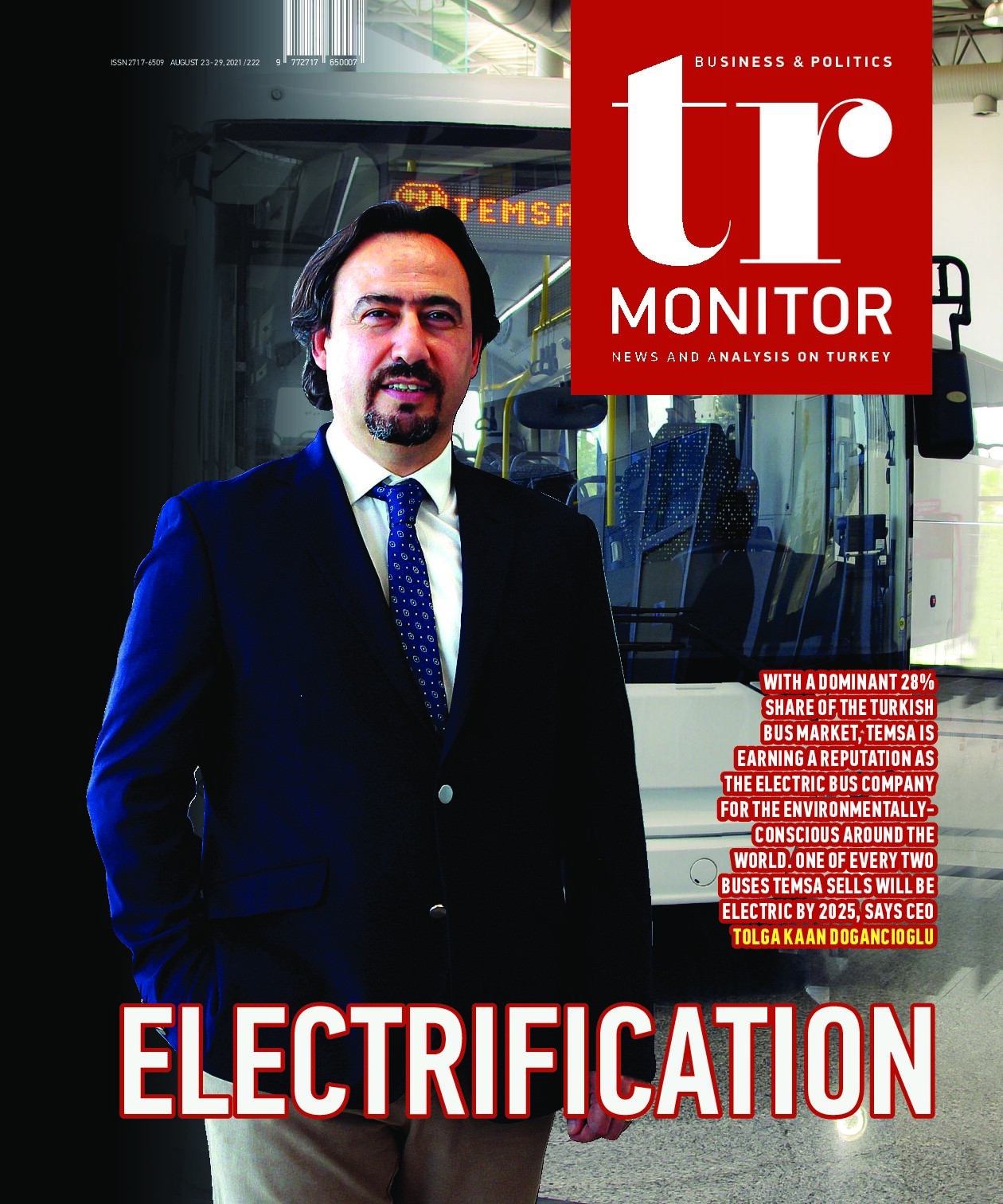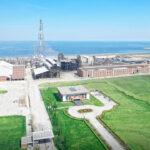By HANDAN SEMA CEYLAN
It would be a mistake to call what happens when you turn the ignition of a TEMSA electric bus “roaring to life”. In fact, if TEMSA has its way, the very phrase may someday have to be discarded. The Turkish bus producer’s electric buses don’t roar, they don’t smell like petrol and they move silently along roads. And, according to the company’s CEO, Tolga Kaan Dogancioglu, this is the future.
After producing its first electric bus five years ago, the Sabanci Holding subsidiary, which produces one out of every three buses sold in Turkey and exports to 66 countries, is earning a reputation as the electric bus company for the environmentally-conscious around the world. Moreover, this has happened at a time when Sabanci bought back the company from the fund it was sold to after a financial bottleneck and almost came back to life again by establishing a fifty-fifty partnership with PPF Group, the producer of Skoda. TEMSA’s 2025 target is even bigger: The company wants one of every two buses it sells to be electric.
We met TEMSA CEO Tolga Kaan Dogancioglu at the company’s factory in Adana, where we toured buses with no rear doors manufactured for the U.S. market and where different buses, minibuses and light trucks are produced for different purposes. TEMSA produced more than 10,000 buses and made TRY 771.5m in net sales last year. Dogancioglu, who became CEO last October, explained the company’s history and what comes next.
In May 2019, Sabanci Holding sold TEMSA to Switzerland-based True Value Capital, owned by investor Enver Rifki Unver and his wife Rukiye Devres Unver, with a valuation of USD 140m, for approximately USD 60m, including debts. Nine months later, the group bought the company back, this time with a partnership, after intense efforts of both local actors in Adana and the banks, according to Dogancioglu. “Moreover, a foreign investor was brought to the country during the pandemic,” he says.
TEMSA, which was found in 1968, and its 510,000 square-meter production facility, which was established in Adana in 1987, came to life again with the fifty-fifty partnership between Sabanci Holding and PPF Group, the umbrella company of Skoda Transportation.
Dogancioglu notes that the comoany had gone into concordat, a system that provides an umbrella of protection for companies by deferring their debts. “We had to make decision between reputation and protection and voted for reputation,” he says. “We got out of the concordat process, which could last for four years, voluntarily in 45 days. Moreover, we managed it with a settlement with all of our 700 suppliers. It was an incredibly fast process. All employees here kept the company dynamic during this whole process.”
Dogancioglu is a mechanical engineer with a bachelor’s degree from Middle East Technical University. He has been in business, 95% of which he spent in automotive-related fields, since 1994. It was this passion for the industry that he came across with Sabanci Holding at the beginning of 2018 and became involved in the TEMSA partnership process the Czech shareholder PPF Holding in May 2020 and then took the CEO seat on October 23.
A foolproof partnership
Dogancioglu defines the partnership as foolproof. “We have significant market share in Turkey, neighboring countries, France, UK and the U.S. Skoda, meanwhile, has historically been strong in the Czech Republic, Slovakia, and Central Europe, all former Iron Curtain countries,” he explains. TEMSA supplies one out of every three public transportation vehicles sold in Turkey, with its expertise in dealer management, tourism, intercity transportation and personnel transportation. The Skoda side is strong in trains, trolleybuses and trams. “Moreover, we took another important step despite the pandemic,” Dogancioglu notes referring to the 143% paid-in capital increase of the two partners from TRY 210m to TRY 510m million last month.
Dogancioglu says he has a lot of respect for TEMSA, because it opened Turkey’s first R&D center, producing the first electric vehicle in Turkey in 2014, making the first domestic autonomous vehicle. “We do the technology first, it takes some time to commercialize it,” he notes. “We are talking about a company that allocates 4% of its revenue to R&D even in its most difficult times. We also have a technology company named TEMSA Tech, which we founded with an understanding that we know our own business better than technology companies.” Automotive products are the least respected areas in the tech world and do not get the attention they deserve although they have more sophisticated software and hardware systems than a mobile phone, according to Dogancioglu. Therefore, TEMSA Tech wants to evolve into a company that produces batteries, battery management systems and mobility technology, he adds.
TEMSA made its first exports to Sweden with its MD9 electriCITY model. The six vehicles produced in Adana will be used in and around Öckerö Island, which aims to completely eliminate its carbon footprint by 2030. These vehicles, which were sold to Connect Bus, one of the most distinguished local operators of the region with a fleet of 1,000 vehicles, will be used for the public transportation activities of Öckerö Municipality, which consists of 10 different islands. The export is also special for the company for taking place at such a time when the company just got out the concordat process.
Test drive continues in California
The company exports to 66 countries. Children go to school with TEMSA vehicles in France for instance. Employees of almost all of the top companies in Silicon Valley like Google, Tesla and Facebook are transported by TEMSA vehicles. TEMSA wants to take a leading role in the spread of the environmental movement, Dogancioglu says. “Around 1,000 TEMSA vehicles are currently hitting the roads in North America, including Canada. We aspire to ensure that these are renewed with new generation technologies. Currently, our test vehicles are in California. We will sell there too,” he adds.
When it comes to Turkey, “the public should also be demanding for electric buses,” he says. “Not only municipalities and local governments, but also we as the people.”
TEMSA’s Adana facility employs 1,400 people but it has an ecosystem that indirectly employs up to 8,000. There are suppliers in Adana which only produce for TEMSA, Dogancioglu says. “There are also companies that come and invest in Adana to be able to supply for TEMSA. We also have stakeholders in software and hardware. Additionally, we support technology through cooperation with two state universities in Adana and a private university in Mersin.”
Speaking about his future plans, the automotive business requires long-term planning, according to Dogancioglu. “The product you make should still feel like a new product even after 10 years. You will design it today, you will produce it in three years, it will last for four years, and you will have to keep it updated with minor modifications in the next four years. You have to be able to looking to a 12-13 year horizon,” he explains. “That’s why people trained at TEMSA can take on senior positions in the world’s best companies.”
The company’s budget targets are also clear: TRY 2.3bn turnover for 2021, TRY 4.3bn for 2022, and TRY 5.5bn for 2023.
ELECTRIC BUS DEVELOPED WITH ASELSAN TO SETT OFF IN SAMSUN
Avenue EV, the first 100% domestic electric bus of the Turkish automotive industry, developed by TEMSA in partnership with ASELSAN, one of Turkey’s largest defense industry companies, will set off in Samsun. Thus, Samsun Metropolitan Municipality will start a new era in the city. The daily operating cost of the bus, which can provide 24-hour uninterrupted service, can be reduced to TRY 15. The same cost is around TRY 1,500 for diesel fueled vehicles. Buses with the new generation ultra-fast charging feature and lithium titanate battery technology can reach a full charge in 15 minutes. Fully-charged, it can travel 80 kilometers. ASELSAN has localized the imported parts of the vehicle such as the electric motor, traction inverter, high voltage battery, main computer and instrument panel.
AUTONOMOUS MODEL TO HIT THE ROAD FOR TESTING IN 2022
TEMSA has two different models of electric buses, Avenue Electron and MD9 electriCITY. The autonomous MD9 electriCITY project continues. It will hit the road for testing in 2022.
TURKEY BUS MARKET AND TEMSA (2019, number)
Intercity bus market: 355
City bus market: 282
Midibus: 1,489
Market total: 2,126
TEMSA’s share: 599
TEMSA’s market share: 28%










